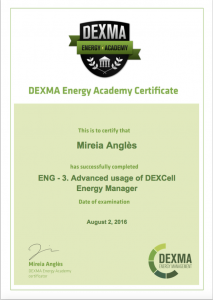Energy management is a profession that’s growing in demand, but also in competition. To get and stay ahead in the industry, there is more and more pressure on energy managers to demonstrate their skills, knowledge and expertise. One way of doing this is through certification. In this article, we focus on the how and why of becoming a certified energy manager.
How to Become a Certified Energy Manager?
With increasing investments worldwide in energy efficiency in buildings (estimated to be USD 90 billion), consequently, we’re seeing an increased demand for skilled energy professionals. Organisations need energy experts that can make strategic energy decisions, lead energy efficiency projects, and ultimately, make the organisation more efficient and cut costs.
Aside from a relevant degree and experience, employers may also seek professional certifications when hiring their next energy manager or consultant.
To improve your employability and recognition in your field you might want to consider getting an official energy management certification. Having a certification on your CV and LinkedIn profile can showcase your expertise and give you an edge in a competitive industry.
Why should I bother with certificates? Why become a certified energy manager?
If you’re already an experienced energy pro, you might be thinking “why do I need a piece of paper, when I know how to do my job?”.
Good point.
Of course, your experience and track record to date will be the most important proof of your abilities. However, certifications can add a valuable feather to your cap. You might not have needed a certificate to get your current job. But nowadays certifications are becoming more and more common in the industry, and are particularly sought after in the UK and US.
Recognised certifications can demonstrate that you are a top professional and that you can add value to a project, especially if you work with international clients and partners. Depending on the country and industry, certifications may be expected or even mandatory. For instance, in the US, the Department of Energy, Agency for International Development, State Department, Fortune 1000 companies, utilities, energy service companies, and others officially recognise the CEM certificate.
The energy industry is dynamic and ever-changing. It’s essential to keep up to date with legislation, compliance and reporting requirements through training and continuing professional development.
Certifications are a great way to learn about the latest requirements in the industry, and some require regular renewals every few years to make sure you’re clued up on the latest industry developments.
If you are looking to change job now or in the future, certificates can give you an edge over other candidates and may even be an essential requirement for some employers.
Here we give a round-up of the top certifications out there:
1. Certified Energy Manager
The CEM Certificate offered by the Association of Energy Engineers (AEE) is the most widely recognised energy management certification worldwide, primarily in the US where it’s a requirement for most energy manager positions.
It’s a rigorous certification, covering everything about how buildings use energy and how to identify potential savings. Candidates attend a CEM training seminar, pay a fee and take the official exam at one of 280 remote testing centres. There are two centres in Western Europe – in the UK and Ireland, and others across New Zealand, the Middle East, Africa and Asia.
The training and exams are offered in multiple languages. CEMs need to show continuing professional competency in their careers and renew the certification every three years.
The AEE has a list of approved training providers that run preparatory seminars for the CEM exam. They are mainly US-based, on-site courses, but some offer online options too.
What are the employment prospects for a Certified Energy Manager? CEMs go on to various jobs, such as:
- Energy Engineers
- Energy Managers
- Building Facility Managers
- Government Facility Managers
- Industrial Facility Managers
- Utility Account Managers
- Energy Service Performance Managers
- Energy Efficiency Consultants
- Project Engineer Resource
- Efficiency Managers (REMs)
2. Chartered Energy Manager
This certification is offered by the Energy Institute (EI), aimed at in-house energy managers. Candidates need to apply jointly for professional membership of the EI. It involves submitting a detailed professional development review, continuing professional development plan, academic records etc, and paying a fee.
The UK-based Energy Institute offers three levels of training for energy management professionals from introductory to advanced, for those new to energy management as well as those aiming to become Chartered Energy Managers.
Level 1 is available online or as a 5-day course in London, Level 2 is a 150-hour online course, and Level 3 is a 12-day taught the course in London. They also offer tailored, bespoke training in the UK and internationally.
3. European EnergyManager (EUREM)
The EUREM programme to enhance the skills of technical experts in energy efficiency is offered in 30 countries around the world (not only in Europe, despite the name!). The training is aimed at technical experts, executives and energy service providers and consists of 160 face-to-face teaching units of 45 minutes each, plus the “energy concept” practical project work.
4. Professional Energy Manager (PEM)
The PEM Certification is offered by Schneider’s Energy University in partnership with the Institute of Energy Professionals. The PEM exam is one of the longest-running energy education programmes and is now available worldwide through the Energy University website. There are a number of recommended online courses you can take to prep for the exam.
5. DEXMA Energy Academy Certificate
At DEXMA, we have our own online Energy Academy. It has two different blocks: one about using DEXMA software and another about general Energy Management. With these courses, you can quickly train your teams both technically and commercially. The courses consist of short video tutorials and a final exam to evaluate each of them, with a certificate on completion.
Getting trained up
There are many many other training courses in centres across the world, whether you’re at the start of your career or an experienced energy manager looking to upskill. To name a couple, the Energy Managers Association in the UK and CIET in Canada.
Some employers finance training and accreditation as part of their professional development schemes, so it’s worth having a chat with your employer and looking up centres near you.
Whether you are certified or not, there are other things you can do keep on top of the latest energy trends and developments:
- Online courses can give you the flexibility of training at a time that suits you, from the comfort of your home, or favourite cafe 🙂 We look at a few of these online courses in our blog post 5 MOOCs to Shine as Energy Professional.
- Other great training resources include webinars, blogs and whitepapers. You can download free energy efficiency resources here.
- LinkedIn groups are a good way to follow trends and have conversations with people in your network. Some relevant groups are Energy Managers, Energy Management Academy, Energy Sector – Management & Leadership.
- Do you know about Quora? It can be a useful place to go for answers to questions about everything and anything. You can browse topics like Energy Management, ask your own questions to the Quora community or share your knowledge by answering other people’s queries.
Have any more doubts about certification, energy management, or the meaning of life? Get in touch, we’ll lend you an ear. We might not solve your existential crisis, but quite possibly your energy crisis 😉




